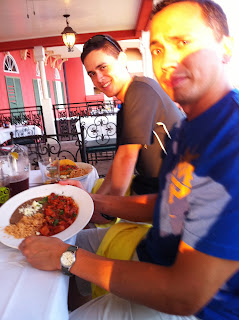(Here is a picture of General Harding, the first three-star general to lead the Air Force JAG Corps.)

The OIL exam was the last substantive part of the course. But it signified something more for me and the other members of Charlie Flight. Going into that test, we had a 4.5-point lead over the three other flights in the race for the Commandant's Cup, an award given to the flight that has the best combined academic and athletic performance over the entire course. Throughout JASOC, for each test and athletic competition (volleyball, soccer, ultimate frisbee, PT test, softball), three points were given to each first-place finisher, two for each second-place finisher, one for each third-place finisher, and zero for last place. Fueled largely by our athletic dominance, Charlie Flight had built up a good lead, but it wasn't insurmountable; we could give it all up with a bad OIL test and a poor finish in the last Commandant's Cup event, the Capstone Leadership Challenge, a kind of obstacle-course-slash-scavenger-hunt that involves running around the base and completing various challenges, Amazing-Race style.
We weren't informed of the OIL test results prior to the start of the Capstone Leadership challenge on Thursday morning, the day before graduation. So we figured we had to place well on that to ensure our victory. Our first task was to field strip and reassemble an M-16. They might as well have asked us to rebuild a car engine. But we struggled through and finally moved on to our second task. After that task we were running back to the JAG school through a field when I stepped in a hole, heard my left ankle pop a couple of times, and went down like a ton of bricks. I spent the rest of the morning at the med center, where a PA confirmed that nothing was broken, but I had a pretty bad sprain. I felt pretty stupid about it all. The last day before graduation! And worse yet, I later learned that Charlie Flight came in last in the Capstone Leadership Challenge, by less than a minute - which meant that the five or so minutes everyone spent hovering over my prone body after I fell might have cost us the Commandant's Cup.
(Here are some photos of my ankle taken today, a few days after the sprain, along with a picture of the boot I'm now sporting, courtesy of the Air Force.)



So fast-forward to graduation and me sitting in Kuhfeld auditorium, fearing I'd make a fool of myself as I hobble across the stage in my one ski boot and dreading the news that we've lost the Cup.
Those concerns faded away as I listened to General Harding speak. He worked his way through the first three of four "pillars" that reflect the foundations of and goals he has set for the corps - Teaming between paralegals and jags, Military Justice and Legal Assistance. He began discussing the fourth pillar, Training, with a story. One of his assignments was Staff Judge Advocate to U.S. Strategic Command, a joint-forces command staffed with personnel from all branches of the military that is responsible for overseeing the country's national defense. The command was in the middle of a comprehensive exercise when a photo came on their main screen.
It was a photo of the first tower of the World Trade Center hit on 9/11.
He assumed it was just a terrible accident, as did the others at Strategic Command, and the exercise continued. When reports of the second tower attack came in, they knew this was for real, and the exercise was cancelled at a cost of millions. And when they learned that the Pentagon had been hit and evacuated, the gravity of the situation truly hit them: with nobody in the Pentagon, Strategic Command was solely responsible for coordinating the country's defenses.
Minutes after the Pentagon was hit, Strategic Command received word that United 93 was believed hijacked and headed back towards the Capitol. The command then fielded a phone call informing them that the President had ordered that United 93 be shot down. One by one, the different units were asked for their assessment and agreement. When it finally got down to General Harding, the commander looked at him and said, "What do you think? Can we do that?"
As General Harding retold the story, you could hear a pin drop. The importance of that question was not lost on any of us. Can we do that? Can we legally use American forces to shoot down a plane full of U.S. Citizens? General Harding didn't tell us what his answer was, because the answer isn't important. And it will never be important because of the courage of the passengers on that plane. But the question is important. It was important for us to understand is that these are the kinds of ultimate questions that JAGs may be called upon to answer, and that we may not be able to consult with others in answering them. That we may find ourselves faced with that question, with nothing but our judgment and our training to rely on.
That story, that thought, and that question are what keep me from transitioning quickly back to my civilian life today. They remind me why I applied for a commission almost four years ago, why I raised my hand and took that oath, and why, as crazy as it seems, I've spent over three months this year in Montgomery, Alabama.
(As for the Commandant's Cup, we won by a half a point. And I made it across the stage with minimal hobbling. I'll post some pictures from graduation as soon as I can.)
Posted using BlogPress from my iPad





































